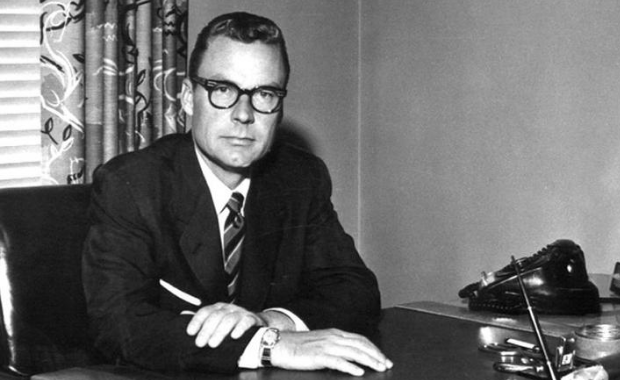Change Your Mindset
11 Principles About Success From The Strangest Secret by Earl Nightingale

Over 60 years ago, an insurance agency owner named Earl Nightingale decided to record a motivational speech for his sales team. Although he didn’t know it at the time, this speech about success would grow so much in popularity that he would need to dedicate a significant amount of time to managing the demand. “The Strangest Secret” by Earl Nightingale sold over a million copies and earned the first Gold Record for Spoken Word.
The following principles about success from it still apply as much today as they did back then.
1. We live today in a golden age with abundant opportunities
There will be more opportunity this year and next than there has been for a while. A down economy is a breeding ground for new businesses and opportunities for people to reinvent themselves if they need to. It’s time to work on that idea you’ve kept hidden in a notebook for the last few years.
2. Success is the progressive realization of a worthy ideal
Success is not necessarily about making a lot of money. If you find your passion and love what you do, then you found success. If following your passion leads to the creation of something valuable, making a steady income should never be a problem.
3. 95% of people forfeit success for conformity
In an age of social media where everyone needs to be online, this could not be more true. Part of the problem is that smartphones and social media have been designed to attract people and eat up all our time. That’s why you should consider doing a digital detox in order to clear your head and find a path to success.
“All you need is the plan, the road map, and the courage to press on to your destination.” – Earl Nightingale
4. Instead of competing, all we have to do is create
We have more resources now for flexing our creativity. Open-source software, free YouTube tutorials, and low-cost methods of prototyping have made it very inexpensive to try inventing a new product or service. If you don’t like the idea of a 15 or 20 year race to hit C-level, focus on creating a solution to a problem instead. There’s definitely still sacrifice and long hours involved, but the rewards can be significantly greater.
5. People who set goals succeed because they know where they’re going
Nightingale makes a great analogy for setting goals in The Strangest Secret. He compares people who do or don’t set goals with ships. The ship that has its voyage mapped out with a captain and crew will arrive at its destination the majority of the time. It has a definite goal. The other ship doesn’t have its voyage mapped out, no crew, and does not know where it’s going. They send it out from a harbor and where does it go? Nowhere.
6. They both work hard
The best part of this analogy is pointing out how hard work isn’t enough. We can work really hard, but without setting the right goals, that hard work may not take us anywhere. I’ve definitely been in situations like this before. During high school, college or my professional life, it has always felt more fulfilling to be working toward a specific goal instead of going through the motions.
7. We become what we think about
This one needs some clarification. No matter how hard you think about becoming an 18-wheeler semi-truck, it probably won’t happen. What you can think about and weave deep into your brain is your goal. I know this works from personal experience. If you deliberately think about a goal right when you wake up in the morning and go to bed at night, it will start to affect your day-to-day decisions more and more. Gradually, you will end up on a clear path toward meeting that goal.
8. Believe and succeed
You can believe you’re a success and become one. There are plenty of people who have a lot of money that still don’t believe they are successful or feel unfulfilled. It’s because a lot of the time, money follows success, not the other way around. Nightingale wasn’t the first person to say this and he hasn’t been the last, either. Our mindset dictates our happiness and success, so it’s crucial that we take care of it.
“Whatever we plant in our subconscious mind and nourish with repetition and emotion will one day become a reality.” – Earl Nightingale
9. Everything worthwhile in life came to us free
Even if you were given a smartphone for free as a kid, that’s not what this means. Our friends, family, and our minds are all given to us for free. Things that cost money are very cheap and can be replaced pretty quickly. The paradox is that many people take things for granted that can’t be replaced. Whether it’s excessive drinking, drugs, neglect, or whatever – many people make worthless things a priority instead of focusing on what truly matters for finding success.
10. We must be willing to pay the price
Success will never come for free. Whether that’s having good relationships, good health, or a good financial situation. It always comes with a cost. Trying to avoid paying the price will only lead to more hardship. Once you understand this, it will make the journey infinitely easier than if you tried avoiding the hard work and discipline.
11. Ideas are worthless unless we act on them
Good ideas are a dime a dozen. I’ve had plenty and I’m sure you have, too. But ideas themselves don’t do anything. We need to take action instead of sitting around talking about how this or that would be a million-dollar idea. It seems like some people also tend to think that if they thought of something first, it belongs to them. History shows that even if you go out and file for a patent, competition can easily spring up. The only option is meeting your market with action as soon as you can, then building on that success with more.
When The Strangest Secret came out, it not only helped grow an industry of personal development but millions of individuals as well. If you take what Earl Nightingale said to heart and remain creative, set goals, think positive, and stay action-oriented, your road to success will be a lot simpler. Simple still doesn’t mean easy, but no worthwhile adventure should be.
Finances
Why Financial Stress Is One of the Biggest Barriers to Personal Growth
Debt, anxiety, and sleepless nights aren’t just money problems, they’re personal growth killers hiding in plain sight.

Broke and stressed? Welcome to the club. (more…)
Life
10 Research-Backed Steps to Create Real Change This New Year
This New Year could finally be the one where you break old patterns and create real, lasting change.

Every New Year, we make plans and set goals, but often repeat old patterns. (more…)
Change Your Mindset
The Silent Skill That Makes People Respect You Instantly
What truly earns respect and why most people go about it the wrong way

Everybody craves respect but not everyone earns it. Some people believe that a title, years of experience, or a position of authority automatically entitles them to respect. (more…)
Change Your Mindset
How to Turn Your Mind Into Your Greatest Asset (Instead of Your Enemy)
The thoughts you feed your mind today quietly become the life you live tomorrow.

The human mind has two parts: the conscious mind and the subconscious mind. Both work together, but each has a very distinct role in shaping your life, decisions, habits, and results. (more…)
-

 News2 weeks ago
News2 weeks agoBrandon Willington Builds 7-Figure Business by Ignoring Almost Everything
-

 Health & Fitness3 weeks ago
Health & Fitness3 weeks agoWhat Minimalism Actually Means for Your Wellness Choices
-

 Did You Know3 weeks ago
Did You Know3 weeks agoWhy Most Online Courses Fail and How to Fix Them
-

 Business3 weeks ago
Business3 weeks agoIf Your Business Internet Keeps Letting You Down, Read This
-

 Business1 week ago
Business1 week agoEntrepreneur’s Guide to Pay Stubs: Why Freelancers and Small Business Owners Need a Smart Generator
-

 Business5 days ago
Business5 days agoThe Salary Shift Giving UK Employers An Unexpected Edge
-

 Business7 days ago
Business7 days agoThe Simple Security Stack Every Online Business Needs
-

 Scale Your Business6 days ago
Scale Your Business6 days ago5 Real Ways to Grow Your User Base Fast


























